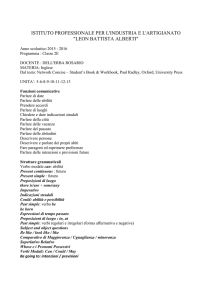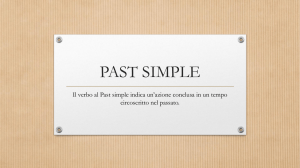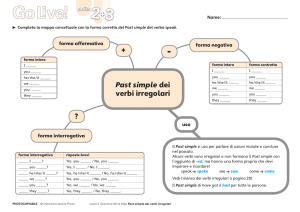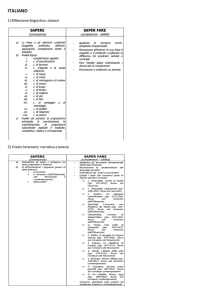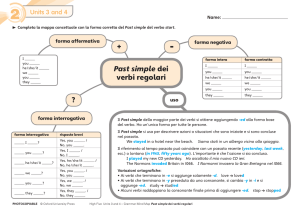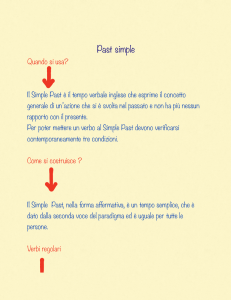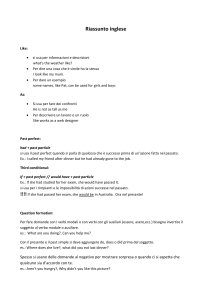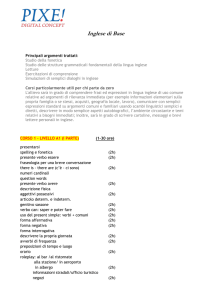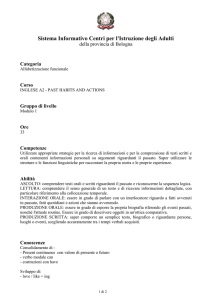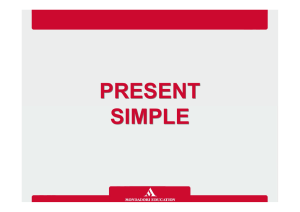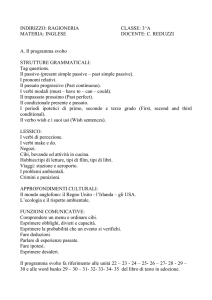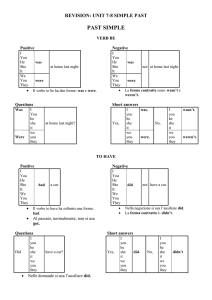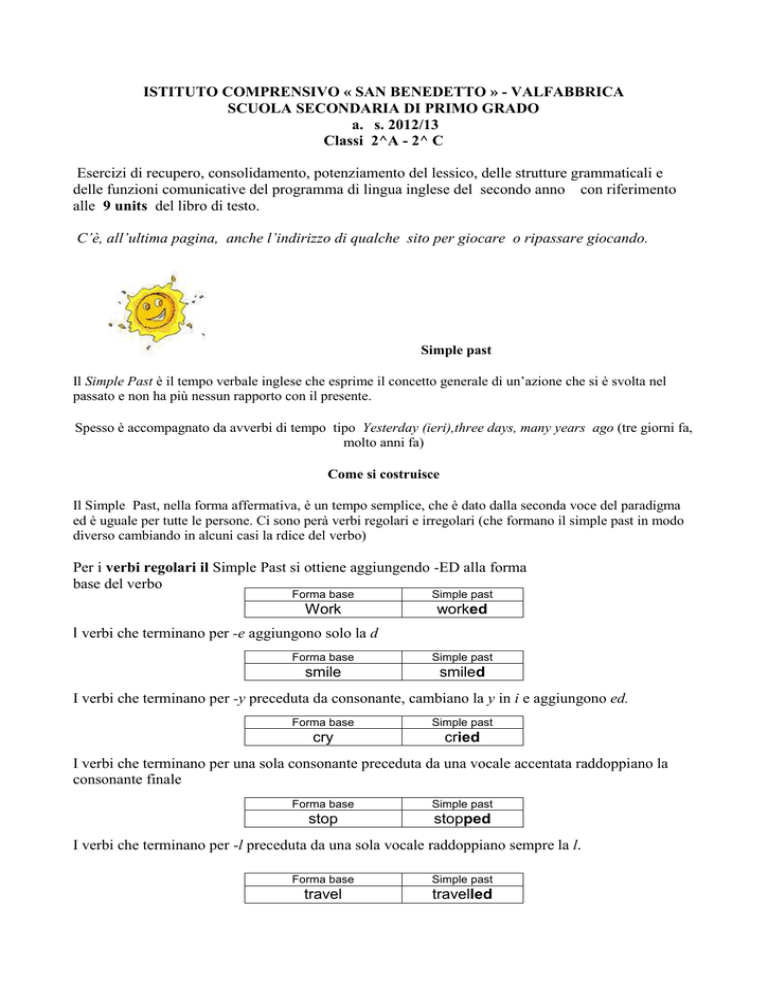
ISTITUTO COMPRENSIVO « SAN BENEDETTO » - VALFABBRICA
SCUOLA SECONDARIA DI PRIMO GRADO
a. s. 2012/13
Classi 2^A - 2^ C
Esercizi di recupero, consolidamento, potenziamento del lessico, delle strutture grammaticali e
delle funzioni comunicative del programma di lingua inglese del secondo anno con riferimento
alle 9 units del libro di testo.
C’è, all’ultima pagina, anche l’indirizzo di qualche sito per giocare o ripassare giocando.
Simple past
Il Simple Past è il tempo verbale inglese che esprime il concetto generale di un’azione che si è svolta nel
passato e non ha più nessun rapporto con il presente.
Spesso è accompagnato da avverbi di tempo tipo Yesterday (ieri),three days, many years ago (tre giorni fa,
molto anni fa)
Come si costruisce
Il Simple Past, nella forma affermativa, è un tempo semplice, che è dato dalla seconda voce del paradigma
ed è uguale per tutte le persone. Ci sono perà verbi regolari e irregolari (che formano il simple past in modo
diverso cambiando in alcuni casi la rdice del verbo)
Per i verbi regolari il Simple Past si ottiene aggiungendo -ED alla forma
base del verbo
Forma base
Simple past
Work
worked
I verbi che terminano per -e aggiungono solo la d
Forma base
Simple past
smile
smiled
I verbi che terminano per -y preceduta da consonante, cambiano la y in i e aggiungono ed.
Forma base
Simple past
cry
cried
I verbi che terminano per una sola consonante preceduta da una vocale accentata raddoppiano la
consonante finale
Forma base
Simple past
stop
stopped
I verbi che terminano per -l preceduta da una sola vocale raddoppiano sempre la l.
Forma base
Simple past
travel
travelled
I verbi irregolari, avendo un paradigma particolare, devono essere imparati a memoria, per lo
meno quelli più usati
Be
have
eat
drink
Paradigma inglese
was
had
ate
drank
been
had
eaten
drunk
Il Simple Past è un tempo semplice e i verbi non-ausiliari hanno bisogno dell’aiuto di un ausiliare
(did) per fare le forme interrogative e negative.
Esercizio n.1 Completate le seguenti frasi con il simple past di to be poi trasformatele nelle
forme interrogative e negative.
1. She…………………..in Paris last month
…………………………………………………….
…………………………………………... ………
2. They ..........................at school yesterday.
………………………………………………………..
…………………………………………………………
3. Mary...........................in Madrid in 1992.
……………………………………………………….
……………………………………………………….
4. They.......................at the airport two hours ago.
…………………………………………………….
……………………………………………………..
5. We.......................ill three days ago.
…………………………………………………
……………………………………………………
6. That dress.....................very elegant.
……………………………………………………
…………………………………………………….
7. There..............................some beautiful roses in her garden.
……………………………………………………………….
………………………………………………………………..
8. She........................at the hotel with her friend Mary.
……………………………………………………………
……………………………………………………………….
9. There...................a dog on the armchair.
………………………………………………………….
……………………………………………………………
10. You.......................in the park with Tom.
…………………………………………………………..
……………………………………………………………
Esercizio n.2 Rispondete alle domande come nell’esempio.
Ex. Was he rich? (no/poor)
No, he wasn’t. He was poor.
1. Was he English? (no/French) ……………………………………………………………..
2. Were they students? (no/workers) ………………………………………………………..
3. Was Sheila tall? (no/short) ………………………………………………………………..
4.
5.
6.
7.
8.
Was that book interesting? (no/boring) ……………………………………………………
Were you happy? (no/ sad) ………………………………………………………………..
Was the kitchen clean? (no/ dirty) ………………………………………………………..
Was John fat? (no/thin) …………………………………………………………………..
Were the children at home? (no/ at school) ………………………………………………
Esercizio n.3 Sostituisci ai verbi tra parentesi la forma corretta del simple past poi volgi le frasi alla
forma negativa, interrogativa
1. Mary (listen)………………………….to the new CD by U2 at John’s party.
………………………………………………………………………………………………………………
…………………………………………………………………………………..
2. She (study)....................................English and Italian at school.
………………………………………………………………………………………………………………
……………………………………………………………………………………
3. They (watch)...................................a football match on TV last night.
………………………………………………………………………………………………………………
……………………………………………………………………………..
4. Jack (play)................................volleyball the day before yesterday.
………………………………………………………………………………………………………………
……………………………………………………………………………………
5. He (travel).................................by train last month.
………………………………………………………………………………………………………………
………………………………………………………………………………….
6. They (live )................................ in a house in the country while they were in England.
………………………………………………………………………………………………………………
…………………………………………………………………………………..
7. They (prefer)..............................to go to the seaside instead of the mountains.
………………………………………………………………………………………………………………
……………………………………………………………………………………
8. He (work)..................................till eleven o’clock last night.
………………………………………………………………………………………………………………
………………………………………………………………………………….
9. Tessa (try)..................................to call you this morning.
………………………………………………………………………………………………………………
…………………………………………………………………………..
10. They ( stop).................................at the restaurant to have something to drink.
………………………………………………………………………………………………………………
…………………………………………………………………………………..
Esercizio n.4 Intervistate un amico e chiedetegli:
A che ora si è alzato ieri
………………………………………….
A che ora ha fatto colazione
-……………………………………………..
Che cosa ha mangiato per colazione
……………………………………………….
Come è andato a scuola e quanto ci ha impiegato
…………………………………………………..
A che ora è tornato da scuola
………………………………………………………..
Che cosa ha fatto dopo pranzo
………………………………………………………
Se ha incontrato gli amici nel pomeriggio
……………………………………………………….
A che ora ha cenato e che cosa ha mangiato
…………………………………………………………………….
Se ha studiato oppure guardato la televisione dopo cena
………………………………………………………………..
A che ora è . a letto
……………………………………………………………
Esercizio n.5 Scrivi cinque frasi con il simple past
…………………………………………………………………..
………………………………………………………………….
…………………………………………………………………..
……………………………………………………………………
………………………………………………………………….
Esercizio n.6 Metti il verbo nella forma giusta
1 Meg ………………(to watch) a good program on TV last night.
2 The farmer……………… (to carry) the tomatoes in a big bag.
3 He …………………….(to stop) the car just in time.
4 I ……………………(to wait) two hours for you.
5 Wellyn …………………..(to marry) Agatha 6 months ago.
6 I ………………………(to taste) the cherry pie and I (to like) it very much.
Esercizio n.7 Usando le espressioni di tempo tra parentesi, volgete le seguenti frasi al simple past.
1.
2.
3.
4.
5.
6.
7.
8.
9.
10.
It’s cloudy! (yesterday) ………………………………………………………..
He’s in Rome.(two days ago) ……………………………………………………
There are many people at the party. (last night) ............................................
They are at the station. (last night) ……………………………………………
There are many tourists at the seaside. (last week)…………………………………..
She’s at the supermarket. (three hours ago) …………………………………………..
Frank’s at home. (this morning) …………………………………………………….
Mary is at school.( five minutes ago) ………………………………………………….
The Browns are at the cinema. (yesterday night) …………………………………….
There’s a film on tonight. (last night) ……………………………………………..
Esercizio n.8 Ricomponi la frase emettila al past simple
1 Jim / his head / cover …………………………………………..
2 she / the chapter / copy ………………………………………..
3 not / the clouds / disappear ……………………………………..
4 he / to our question / refer ……………………………………….
5 not / we / our punishment / escape ………………………………..
Esercizio n.9 Metti was o were al posto giusto
1 The men ………………..very strong.
2 It ………………the right thing to do.
3 The shop………………….. open.
4 My father and I …………………….in the car.
5 The weather…………………. great.
Segna con una crocetta il simple past giusto deii verbi irregolari
Il past Simple di TAKE
A toke
B took
C tak
Il past Simple di MAKE
A maked
B meat
C made
Il past Simple di BUY
A buyed
B brought
C bought
Il past Simple di BECOME
A becomed
B became
C become
Il past Simple di DO
A doed
B did
C done
Il past Simple di BE
A were
B been
C was
Il past Simple di HAVE
A haved
B had
C haed
Il past Simple di GO
A went
B goed
C gone
Il past Simple di DRINK
A drunk
B drinked
C drank
Simple past nella forma interrogativa e negativa
Si usa l’ausiliare DID, e il verbo principale della frase resta invariato nella sua forma base.
Affermativa
Interrogativa
Did I walk?
Did you wal?
Did he. she. it walk?
Did we walk?
Did you walk?
did they walk?
I walked
You walked
He she it walked
We walked
You walked
They walked
Negativa
I did not walk
You did not walk
He she it did not walk
We did not walk
You did not walk
They did not walk
Riassumendo
Forma interrogativa
Forma negativa
DID + SOGGETTO + FORMA BASE
SOGG. + DID + NOT + FORMA BASE*
*Questa forma, DID NOT
si può contrarre in DIDN’T
Esercizii
Esercizio n.1 Metti i seguenti verbi nella forma interrogativa e negativa
1 I worked very hard
…………………………………………………………………
………………………………………………………………….
2 They loved him a lot
………………………………………………………………..
……………………………………………………………………
3 She smiled
……………………………………………………………………
……………………………………………………………….
4 We drank a glass of water
………………………………………………………………………..
…………………………………………………………………………
Esercizio n.2 Translate this letter.
My dear……………..,
Did I tell you that I have been to the contry with mother to choose a house in which to spend our
holidays? I do not think I did. We first went to Peakton, a small place on the mountains, but we did
not like that place and so we went to Seaport which is a beautiful quiet village at the seaside. We
found a very nice cottage which we have rented for two months. I hope you to come to visit me .
I hope to receive a letter from you soon.
Your friend
Robert
…………………………………………………………………………………………………………
…………………………………………………………………………………………………………
…………………………………………………………………………………………………………
…………………………………………………………………………………………………………
…………………………………………………………………………………………………………
Esercizio n.3 Rispondi alla lettera di Robert accettando l’invito
My dear
…………………………………………………………………………………………………………
…………………………………………………………………………………………………………
…………………………………………………………………………………………………………
…………………………………………………………………………………………………………
………………………………………………………………………………
Esercizio n.4 Dai short answer alle seguenti domande seguendo le indicazioni tra parentesi.
1.
2.
3.
4.
5.
6.
Did you miss the bus? (no) ……………………………..
Did she talk about her favourite book? (yes) ………………………..
Did it snow all day? (yes) ………………………………………….
Did Joe play football well? (no) ………………………
Did you tidy your room? (no) …………………………………
Did Mark answer the phone? (yes) …………………………….
Esercizio n.5 Completa i seguenti mini- dialoghi con il verbo adeguato al simple past.
1. A. Did you speak to John?
B. No, but I.................................to his brother.
2. A. Where did you find my wallet?
B. I...............................................it under the desk.
3. A. Did you buy this jumper at Benetton’s?
B. No, I..........................................it at the market.
4. A. Did he take you to school by car?
B. Yes, he.......................................me in his wonderful Ferrari.
5. A. How much did you pay for your new computer?
B. I.................................................about 1000 pounds for it.
6. A. Did Tom make many mistakes in his test?
B. No, he only........................................two.
7. A. Did she sleep till eleven this morning?
B. No, she............................................till 9.30.
8. A. Did he drink gin at the party?
B No, he.............................................wine.
Esercizio n.6 Riscrivi le frasi nella forma negativa
1 They collected postcards…………………………………….
2 You jumped high. ………………………………………….
3 Albert played squash……………………………………….
4 The teacher tested our English…………………………….
5 Fiona visited her grandma…………………………………
6 He washed the car. ………………………………………..
7 You were thirsty. ……………………………………….
8 He had a computer. ……………………………………
9 I bought bread. …………………………………………
10bYou saw the house. …………………………………
Esercizio n.7 Ricomponi le frasi e mettile in the simple past
1 Anna / the window / open ………………………………………..
2 she / home / walk …………………………………………………
3 you / in the garden / work ………………………………………..
4 you / a song / sing ……………………………………………….
5 she / on a chair / sit ………………………………………………
6 you / the castle / visit ……………………………………………
7 Jenny / the door / lock ……………………………………………
8 she / happy / be ………………………………………………….
9 Greg / the ball / kick …………………………………………….
10 the car / at the corner / stop …………………………………….
Esercizio n.8 Metti I verbi nella forma corretta
1 Last year I (spend)…………… my holiday in Ireland.
2 It (be) ……………great.
3I (travel)……………………… around by car with two friends of mine and we (visit) …………..lots of
interesting places.
4 In the evenings we usually (go)……………….. to a pub.
5One night we even (learn) ………………………….some Irish dances.
We (be) ……………………very lucky with the weather.
It (not / rain) a lot.
But we (see) …………………………………some beautiful rainbows. .
Where (spend / you) ………………………….your last holiday?
Il comparativo di maggioranza
Ci sono aggettivi monosillabici (detti corti) e quelli plurisillabici (detti lunghi) che formano il comparativo
in modo diverso
L’aggettivo breve forma il comparativo aggiungendo er alla forma normale
Es.
tall = taller ( alto, più alto)
Gli aggettivi che terminano per –e aggiungono solo la –r.
Nice=nicer ( simpatico, più simpatico
- Gli aggettivi che terminano per una consonante preceduta da vocale raddoppiano la consonante e
aggiungono la -er.
Hot = hotter ( caldo, più caldo)
- Gli aggettivi monosillabici o bisillabici che terminano per –y cambiano la y in i e aggiungono –er.
Happy = happier (felice più felice
Il secondo termine di paragone è sempre than
Mary is happier than Sandy
Gi aggettivi plurisillabici formano il comparativo con more che li precede
This book is more interesting than the other one
History is more interesting than math
Il comparativo di minoranza
L’aggettivo viene preceduto da less : il secondo termine di paragone è sempre than
Less + aggettivo + than
Mary is less tall than Andy
Mary è meno bassa di Andy
Il comparative di uguaglianza
Il comparativo di uguaglianza si forma
as + aggettivo + as + secondo termine di paragone
Mary is as tall as Andy Mary è tanto alta quanto Andy
Esercizio n.1 Traduci queste frasi con i tre diversi comparativi
1 La mia casa è più vecchia/ della tua
…………………………………………..
…………………………………………..
…………………………………………….
2 Lucia ha un libro più costoso del tuo
……………………………………………
…………………………………………….
……………………………………………
3 il mio computer è più veloce del tuo
……………………………………………
…………………………………………..
……………………………………………
4 Un elefante è più leggero di un topo……
…………………………………………………
...........................................................................
…………………………………………………
5 Tom è più bello (handsome) di Peter
.
Ci sono dei comparativi e superlativi irregolari
Aggettivo/Avverbio
Comparativo
Superlativo
good buono
well bene
better migliore/meglio
the best il migliore/il meglio
bad cattivo
badly male
worse peggiore/peggio
the worst il peggiore/il peggio
old vecchio
the oldest il più vecchio
older più vecchio
the eldest il maggiore (fra più
elder maggiore (fra due)
di due)
far lontano
farther più lontano
further ulteriore
the farthest -> il più lontano
Esercizio n.2 Traduci
a) New York is bigger than Washington.
……………………………………………………………..
b) Chinese is the most difficult language I’ve studied.
………………………………………………………
d) This film is more boring than the last film we rented.
………………………………………………………..
e) The longest river in Italy is the Po
……………………………………………………….
c) Which is easier – English or Spanish?
…………………………………………………….
Il superlativo inglese
Esistono due tipi di superlativo: assoluto e relativo.
a) Il superlativo assoluto
Il superlativo assoluto – che esprime una qualita’ al massimo grado – e’ quello che in italiano si esprime con
-issimo, -issima, -issimi… quindi bellissimo, grandissimo, altissimo,…
In inglese si esprime in questo modo
oppure…
very + aggettivo
very / really / amazingly / exceptionally / incredibly / remarkably / particularly / extremely / … +
aggettivo
b)Il superlativo relativo
Il superlativo relativo presuppone un riferimento ad una categoria.
esempio: She’s the prettiest of the girls
se l’aggettivo ha più di 2 sillabe deve essere preceduto da the most
The beginning is the most important part of the work.
Esercizio n.3 Metti il superlativo
1 Brian is …………..his brother. (tall)
2 An elephant is ……………….a mouse. (heavy)
3 Bob is …………….Sam. (handsome)
4 Angie is …………….Ron. (thin)
5 Tokyo is ………….Rome. (crowded)
6 He can speak English ………………me. (fluently)
7 Summer days are ……………..winter days. (long)
8 Meat is ……………………fruit. (expensive)
Esercizio n.4 Trasforma l’aggettivo dato al grado superlativo, sia assoluto che relativo:
1. good………………………………………………..
2. much……………………………………………….
3. romantic……………………………………………
4. rich………………………………………………..
5. high………………………………………………..
6. great………………………………………………
7. lucky………………………………………………
8. amusing……………………………………………
9. frightening…………………………………………
10. fast………………………………………………….
11. false…………………………………………………
12. little………………………………………………….
13. cheap…………………………………………………
14. tall……………………………………………………
Esercizi sui comparativi e superlativi
Esercizio n.5 Scegli la forma giusta tra le tre proposte
beautiful
a)beautifuler b)beautifuller c)more beautiful
happy
a)happyer b)happier c)more happ
short
a)shorter b)shortier c)more short
slowly
a)slowlyer b)slowlier c)more slowly
intelligent
a)intelligenter b)intelligentier c)more intelligent
expensive
a)expensiver b)expensiveer c)more expensive
pretty
a)prettyer b)prettier c)more pretty
silly
a)sillyer b)sillier c)more silly
big
a)biger b)bigger c)more big
Esercizio n.6 Trasforma l’aggettivo dato al grado comparativo di maggioranza:
1. hard………………………….
2. difficult………………………
3. heavy…………………………
4. short…………………………..
5. interesting……………………..
6. long…………………………….
7. beautiful……………………….
8. good………………………….
9. much…………………………..
10. easy……………………………
11. loud…………………………….
12. annoying…………………………
13. brave………………………….
14. comfortable………………………
15. expensive………………………..
16. fat………………………………..
17. bad…………………………….
18. little…………………………….
19. exact………………………….
20. gentler/more gentle (ammesse le due forme)
Esercizio n.7 Per ciascuna frase scegli la forma corretta di comparativo fra quelle proposte:
1. The situation is catastrophicer/more catastrophic than we thought
2. You’re older/more old than me, but you look younger/more young
3. We want to move into a smaller/more small house
4. Mount Everest is higher/more high than Mont Blanc
5. I don’t want to spend too much money, so I take this one, that is cheaper/more cheaper
6. Today it is warmer/more warm than yesterday, isn’t it?
7. My sister is younger/more young than me
8. The film we saw yesterday was boringer/more boring than all other films we’ve ever seen
9. She’s nicer/more nice than I thought
10. Your English is badder/worse/more bad than Mary’s
Esercizio n.8 Traduci le seguenti frasi
1 E’ il più gentile dei miei amici
………………………………………………………………………
2 Sto leggendo il libro più interessante che abbia mai letto
………………………………………………………………………
3 Il colore di questo fiore è bellissimo. Il più bello di questo mazzo
………………………………………………………………………..
Alcuni aggettivi hanno un significato di per sé superlativo:
freezing (freddissimo)
wonderful (meraviglioso)
fantastic (fantastico)
marvelous (meraviglioso)
perfect (perfetto)
essential (essenziale)
enormous (enorme)
delicious (delizioso)
awful (orribile)
Present Continuous
Si usa per:
1Azioni in corso es. sto uscendo
2Azioni future accompagnate da un’espressione di tempo es. vado alla stazione domani
Si forma:
l’ausiliare to be al Simple Present e la forma in -ing del verbo della frase.
Se il verbo deve essere messo in forma negativa o interrogativa, si fa la forma negativa o
interrogativa del verbo to be, mentre il verbo nella -ing form rimane invariato al suo posto
Di solito il present continuos è accompagnato dagli avverbi di tempo: ora, adesso, al
momento, in questo periodo …..
Affermativa
Affermativa
I am working
You are working
He /she it/is working
We are working
You are working
They are working
Interrogativa
Interrogativa
Am I working ?
Are you working?
Is he /she /it /working?
Are we working?
Are you working?
Are they working?
Negativa
Negativa
I am not working
You are not working
He /she/ it/ is not
working
We are not working
You are not working
They are not working
Naturalmente si può utilizzare la forma contratta del verbo essere :
I’m not working You aren’t working …….
I Verbi di sentimento ( like, love, hate ) e di conoscenza ( know, undesrtand) non possono essere usati
nella forma progressiva :
I love John/ I don’t love John/ Do you love John?
I understand/ I don’t understand/ Do you undersand?
Eccezione: sto cominciando a capire: I’m beginning to understand.
1 Ora Maria sta giocando…………….
2 Adesso il mio cane mangia ……………………..
3 In questo periodo studio …Ho paura dell’esame …………………………
Esercizio n.1 Adesso scrivi tu cinque frasi
1……………………………………………
2……………………………………………..
3…………………………………………….
4…………………………………………….
5…………………………………………..
Esercizio n.2 Metti il verbo essere nella forma corretta
1 What ………….you talking about?
2 Tomorrow I’… starting at a quarter past eight and I’……. finishing at a quarter to six.
3 We….. going to the cinema this evening.
4 She…… writing an urgent letter just now – can I call you back?
5 ‘Have you spoken to Marco?’ ‘Yes, we……… meeting outside the cinema at a quarter past eight
Esercizio n. 3 Completa le seguenti frasi scegliendo la forma verbale corretta fra le due date:
1. We can’t come with you, sorry. We …………… for our English test (study/are
studying)
2. Don’t call them now! It’s 8 o’clock and they ………………. dinner (have/are having)
3. Look! That man …………. the old lady
(is robbing/robs)
4. My brother always ……………… tennis on Saturdays (plays/is playing)
5. When we …………. to the disco, we ………….. back home very late (go/are going)
(come/are coming)
6. I have got so many doubts. I ……………… to call and tell her the whole truth
(think/am/thinking)
7. You often ……………….. tv in the evening, because you love films (watch/are
watching)
8. Mary is a very good pianist. Listen, now she ………………… Mozart (plays/is playing)
9. We are not lucky. If we ……….. to go out for a walk, it always ……… (decide/are
deciding) (rains/is raining)
10. You won’t find him home today. He …………… to England
(travels/is travelling)
Esercizio n.4 Metti il verbo tra parentesi nella forma giusta
1 You ………………..(to play) tennis tomorrow morning
2 We…………( to have) the final exam next month
3vWendy and Jenny ………….( to get up) right now
4 My grandmother ………………(to make) a delicious cake
5 The airplaine ………..( to fly) over the Alps
Esercizio n.5 Trasformate i verbi dal simple present al present continuous, apportando i
cambiamenti necessari.
1. Isabelle always talks to Mary on the phone……………………………………………..
2. Nicola reads a newspaper every afternoon………………………………………………
3. They never go out in the evening………………………………………………………..
4. He meets her every day………………………………………………………………….
5. They don’t often go to the restaurant. …………………………………………………..
6. What do they do?..............................................................................................................
7. They sometimes go out for a walk in the park…………………………………………..
8. She prepares a cake now and then………………………………………………………..
Esercizio n.6 Chiedere, dire. spiegare.
1. Spiega che John sta studiando inglese.
…………………………………………………………………..
2. Chiedi se Bob sta bevendo un succo di frutta.
……………………………………………………………………
3. Chiedi se gli studenti italiani vanno a scuola il sabato.
…………………………………………………………………..
4. Chiedi alla signora Brown se sta preparando il pranzo.
…………………………………………………………………
5. Spiega a John che sta guidando troppo velocemente (too fast).
………………………………………………………………………
6. Chiedimi a che ora torna da scuola Mary il venerdì.
……………………………………………………………..
7. Spiegami che Mark sta leggendo un libro di avventure.
……………………………………………………………………………….
8. Chiedi alla signora Taylor che cosa sta leggendo.
……………………………………………………………………………………
9. Chiedimi se Miss Smith sta scrivendo una lettera per il signor Smith.
………………………………………………………………………………………….
10.Spiegami che Jenny sta telefonando a John per invitarlo alla sua festa.
…………………………………………………………………………………….
Esercizio n.7 Coniugate i verbi tra parentesi usando simple present o present continuous.
1. My lilies usually……………(flower) in June, but it’s only May and they……………..
(flower) already!
2. I am pleased to see you………………………. (wear) your new shoes this evening.
3. I............................................. (hear) Jack wants to buy a new house.
4. ………………………you,……………………… (know) that girl over there?
5. Turn the music down. It…………………………. (play) too loud.
6. Professor Brown ………………….(speak) in a low voice so I ………………….(not
understand) what he……………………….. (say).
7. What………………….Tony………………………… (do) this afternoon?
8. What…………………………..Julia…………………. (do) in the afternoons?
9. John never……………………………… (listen) to what I say.
10. We ……………………….(pack) our suitcases because we…………………..(leave) for
Germany tomorrow.
Esercizio n.8 Metti il verbo nella forma giusta
1
2
3
4
5
My sister (to clean)…………………. the bathroom.
Look! They (to go) ……………………inside.
I (to wait) ……………………….in the car now.
Mrs Miller (to listen) …………………..to CDs.
We (to speak) …………………………..English at the moment
MUST e TO HAVE TO
Affermativa
Interrogativa
NegativaI
I must
You must
He mus
She mus
It must
Wemust
You must
They must
must I worked ?
must have you worked?
must he worked ‘
must she worked?
must it worked ‘
must we worked?
must you worked?
must they worked?
You must not
He must no
She must not
It must has not
We must not
You must not
They must not
To have to e must hanno di solito lo stesso significato di dovere.
Must è un verbo modale e quindi segue le regole di costruzione degli altri modali:
- è invariabile
- non usa gli ausiliari nelle forme interrogativa, negativa
- i verbi che lo seguono sono all’infinito senza il TO
Es: Must she call the ambulance? = Dobbiamo chiamare l'ambulanza?
She mustn't do it. = Non lo devi fare.
Potenziamento
To have to è un verbo regolare e pertanto è variabile e necessita degli ausiliari nelle forme
interrogativa, negativa (e anche interrogativa-negativa).
Es: You don't have to send it. = Non devi spedirlo.
Did you have to stay at home? = Sei dovuto rimanere a casa?
To have to si usa per tutti i tempi mancanti di must
Es: Evan had to go there. = Evan è dovuto andarci.
Es You will have to prepare dinner this evening. = Dovrai preparare la cena stasera.
She has had to interrupt the meeting. = Ha dovuto interrompere l'incontro.
Esercizio n.1 Riscrivi le frasi nella forma interrogativa
1. You mustn't use your mobile
phone…………………………………………………………………………
2. You don't have to call me every day, once a week is
ok……………………………………………………
3. I mustn't forget my
passport…………………………………………………………………………………
4. You don't have to buy the tickets. I can do
it………………………………………………………………...
5. Passengers mustn't smoke during the
flight…………………………………………………………………
6. I didn't have to wake up early
yesterday……………………………………………………………………...
Esercizio n.2 Usa to have to o must a seconda del significato delle frasi
1 I …… …….. speak English well. I need it in my job.
2. I ………….… speak English well. I love it.
3. I …………
get up at 5:00. I want to go fishing.
4. I………………get up. I don't want to be wrong.
5. I ………………follow the procedures. It's my duty.
6. I ………………earn money for the company.
7 I ………………earn a lot of money. I want to buy a house. ...
8 I ………………wear a suit. It's a formal party.
9. I …………………………..wear a suit. I want to look good.
10. I …………………………..follow the procedures
Come si dice l’orario in inglese. Ti ricordi?
Sul sito sotto indicato puoi trovare espressioni molto usate che riguardano l’orologio
http://www.speakenglish.co.uk/phrases/telling_the_time?lang=it
Traduci e indica sull’orologio
Sono le una e quarantacinque
Sono le dodici p.m
Sono le tre p-m
Sono le otto e trentasette
Sono le tre e cinquanta
E’ mezzogiorno
Giochi
http://www.elefanteapois.com/category/schede-pratiche-per-imparare-linglese
Ed ora giochi per tutti a questo indirizzo ! Divertitevi!
http://www.ddrivoli1.it/portogiocoinfran/giocoinfran.htm
Buone vacanze!

